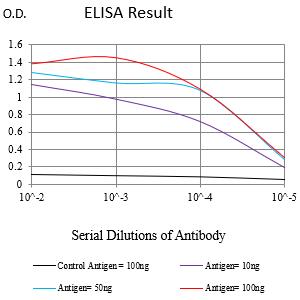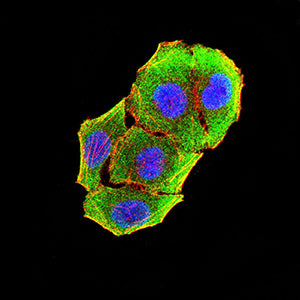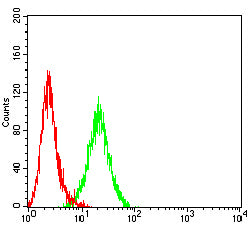


| WB | 1/500 - 1/2000 | Human,Mouse,Rat |
| IF | 咨询技术 | Human,Mouse,Rat |
| IHC | 咨询技术 | Human,Mouse,Rat |
| ICC | 1/50 - 1/200 | Human,Mouse,Rat |
| FCM | 1/200 - 1/400 | Human,Mouse,Rat |
| Elisa | 1/10000 | Human,Mouse,Rat |
| Aliases | IK; IK1; SK4; DHS2; KCA4; hSK4; IKCA1; hKCa4; KCa3.1; hIKCa1 |
| Entrez GeneID | 3783 |
| clone | 1B4B4 |
| WB Predicted band size | 47.6kDa |
| Host/Isotype | Mouse IgG1 |
| Antibody Type | Primary antibody |
| Storage | Store at 4°C short term. Aliquot and store at -20°C long term. Avoid freeze/thaw cycles. |
| Species Reactivity | Human |
| Immunogen | Purified recombinant fragment of human KCNN4 (AA: extra 286-427) expressed in E. Coli. |
| Formulation | Purified antibody in PBS with 0.05% sodium azide |
+ +
以下是关于KCNN4抗体的3篇参考文献的简要信息:
1. **文献名称**:*KCa3.1 channels modulate the processing of amyloid precursor protein in human cerebral endothelial cells and astrocytes*
**作者**:M. T. Branca et al.
**摘要**:研究利用KCNN4抗体检测KCa3.1通道蛋白在脑内皮细胞和星形胶质细胞中的表达,发现其通过调节钙信号影响β淀粉样蛋白生成,提示与阿尔茨海默病病理相关。
2. **文献名称**:*Selective blockade of the intermediate-conductance Ca²⁺-activated K⁺ channel suppresses proliferation of microvascular and macrovascular endothelial cells*
**作者**:C. Grgic et al.
**摘要**:通过KCNN4抗体抑制内皮细胞中的KCa3.1通道活性,证明其可抑制细胞增殖和血管生成,为抗肿瘤血管治疗提供潜在靶点。
3. **文献名称**:*KCa3.1 Inhibition Decreases Size and Alters Composition of Atherosclerotic Lesions Induced by Shear Stress*
**作者**:C. Y. Chen et al.
**摘要**:使用KCNN4抗体及特异性抑制剂阻断KCa3.1通道,发现其减少动脉粥样硬化斑块内炎症细胞浸润和脂质沉积,提示其在心血管疾病中的调控作用。
如需更多文献或具体研究领域(如癌症、免疫学),可进一步补充说明。
×